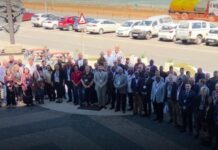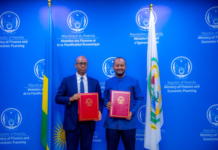By Steve Maphakathe
In a timely Pitso webinar hosted on Friday, 11 April, the North-West University (NWU) Business School featured distinguished panellists who discussed the vulnerable status of African economies caught in the crossfire of escalating international tariff wars. As countries on the continent compete for both economic sovereignty and competitive advantage, the discussion focused on how the economic power struggle between the US and China is changing trade landscapes throughout Africa.
The unpredictable nature of the present tariff environment was highlighted by Khaya Sithole, columnist and director of Regulatory Affairs at the Association of Black Securities and Investment Professionals (ABSIP). He cited the ongoing trade disputes between the US and China, where taxes on some imports have risen to a surprising 125%. Sithole said, “The first thing we are all going to check after this conversation is what the latest tariff rates are,” stressing the unpredictable commercial landscape that African countries must navigate while formulating their economic policies.
Claude de Baissac, founder of Eunomix, emphasised the significance of geopolitical concerns and urged participants to get ready for a future marked by more uncertainty. De Baissac delivered a thoughtful evaluation, hinting at scenarios where the US might aggressively assert economic dominance. “We are no longer in a world where this is not going to happen,” he warned, emphasising the need for strategic resilience in South Africa’s trade policies.
In turn, Stavros Nicolaou, group senior executive for Strategic Trade at the Aspen Pharma Group, addressed the critical importance of trade alignment for South Africa’s economic health. He promoted a pragmatic approach to international commerce, stating: “A country like South Africa, with economic challenges, cannot afford to be partisan or parochial to any particular geography or region in the world. South Africa needs to fully understand trade patterns and it must be open to trading with everyone.” Nicolaou’s argument stressed the need to keep a variety of trade connections rather than aligning solely with one of the two economic superpowers.
Agricultural sector insights came from Wandile Sihlobo, chief economist of the Agricultural Business Chamber of South Africa, who proposed stronger ties with the United States. He said, “The best path for South Africa is to engage with the US on a free trade agreement,” suggesting that in order to obtain favourable conditions, both parties would have to make concessions.
De Baissac provided critique of contemporary tariff diplomacy, particularly regarding the present US administration’s approach. He claimed that, while reciprocal tariffs have traditionally been the foundation of international trade, US President Donald Trump is “abusing the term by calling it political tariffs” when they serve as instruments of economic coercion, intended to pressure international economic entities into accommodating American demands.
The perspectives of these experts illustrate a careful balancing of tasks that is necessary as African economies continue to strive for both the protection of domestic industries and integration into international markets. African nations need to develop smart and flexible strategies to withstand these economic imbalances caused by great powers competing with each other. At the same time, they should advance their own trade interests and sovereignty in a world economy that is becoming increasingly unpredictable.
https://news.nwu.ac.za/african-economies-should-adapt-global-challenges-amid-us-china-tariff-wars








